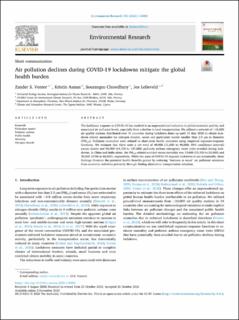Air pollution declines during COVID-19 lockdowns mitigate the global health burden
Peer reviewed, Journal article
Published version

Åpne
Permanent lenke
https://hdl.handle.net/11250/2756538Utgivelsesdato
2020Metadata
Vis full innførselSamlinger
- Publikasjoner fra CRIStin - NINA [2364]
- Scientific publications [1392]
Sammendrag
The lockdown response to COVID-19 has resulted in an unprecedented reduction in global economic activity and associated air pollutant levels, especially from a decline in land transportation. We utilized a network of >10,000 air quality stations distributed over 34 countries during lockdown dates up until 15 May 2020 to obtain lockdown related anomalies for nitrogen dioxide, ozone and particulate matter smaller than 2.5 μm in diameter (PM2.5). Pollutant anomalies were related to short-term health outcomes using empirical exposure-response functions. We estimate that there were a net total of 49,900 (11,000 to 90,000; 95% confidence interval) excess deaths and 89,000 (64,700 to 107,000) pediatric asthma emergency room visits avoided during lockdowns. In China and India alone, the PM2.5-related avoided excess mortality was 19,600 (15,300 to 24,000) and 30,500 (5700 to 68,000), respectively. While the state of COVID-19 imposed lockdown is not sustainable, these findings illustrate the potential health benefits gained by reducing “business as usual” air pollutant emissions from economic activities primarily through finding alternative transportation solutions.
